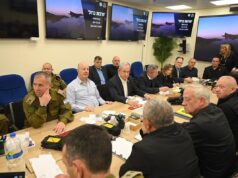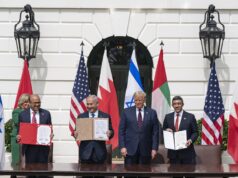The intricate network of tunnels connecting the Gaza Strip with Egypt remains the lifeline of Hamas, allowing it to build up its weapons arsenal and indiscriminately fire rockets into Israel. Some sources estimate that as many as 800 tunnels crisscross the border, with a number of them reaching depths of more than 190 feet. Bedouin smugglers use the tunnels to transfer everything from food and batteries to fuel and cigarettes – and hundreds of tons of arms destined for terrorist hands. The contraband includes AK-47s intended for Hamas and Palestinian Islamic Jihad, as well as Iranian-made long-range missiles, Kassam rocket components, rocket-propelled grenades (RPGs), anti-aircraft and anti-tank missiles, and improvised explosive devices (IEDs).
In September 2005, Israel withdrew from the Gaza Strip and gave Egypt control of the 8.7-mile border between it and Gaza. Today, much of Israel’s security depends on Egypt’s ability and willingness to secure that corridor and successfully halt arms smuggling into the Gaza Strip. Prior to Egypt’s takeover of the corridor in September 2005, approximately one ton of arms were smuggled across the border each year. Immediately after the withdrawal, from September 2005 through December 2008, that number increased drastically: Israeli intelligence sources estimate that 250 tons of explosives, 4,000 RPGs, and 1,800 rockets crossed the border during that span.
Accordingly, ever since Egypt took control of the border crossing four years ago, Israel and the United States have accused Egypt of turning a blind eye to the arms smuggling. For example, in October 2007 Israeli Minister of Internal Security Avi Dichter said, “Egypt could stop the weapons smuggling within one day if it wanted to.” However, until mid-2008, Egypt denied that arms smuggling from the Sinai to Gaza was even taking place. The concern over Egypt’s inaction and negligence precipitated both houses of the United States Congress in December 2007 to withhold $100 million of aid to Egypt until it took concrete steps to halt arms smuggling into Gaza. President Bush subsequently renewed the aid through a Presidential Determination for diplomatic purposes.
On December 27, 2008 in an effort to put an end to continuous rocket fire into Israel from Gaza, Israel launched Operation Cast Lead. A unilateral Israeli ceasefire followed after Israel and the U.S. agreed to a memorandum of understanding (MOU) stipulating enhanced intelligence cooperation between the U.S. and regional governments to prevent arms smuggling. The memorandum also promised increased U.S. assistance to Egypt in its anti-smuggling efforts. Finally, the agreement called for an international monitoring force near the Egypt-Gaza border – an idea that the Egyptian government has summarily rejected.
Since the cessation of Operation Cast Lead, Egyptian President Hosni Mubarak has treaded carefully. On the one hand, he seeks to appease the Egyptian population, particularly after the Arab media and regional leaders portrayed him as a puppet of Israel and the West for not opening the Rafah border crossing (although Palestinians eventually forced it open in January 2008 for eleven days). Hezbollah leader Hassan Nasrallah accused Mubarak of “taking part in the crime,” and Iranian papers labeled Mubarak a “Zionist agent.” Thousands of Egyptians took to the streets to protest Egypt’s inaction, as did many in front of Egyptian embassies throughout the Middle East.
On the other hand, Cairo understood that it needed to do more to secure the border, particularly after Israel made it clear that it reserved the right to operate against tunnel-smuggling if Egypt’s efforts did not prove adequate. It should be noted that this is not antithetical to Egyptian interests; the last thing that Mubarak wants on his doorstep is a heavily armed radical Islamist state run by a group (Hamas) that has extremely close ties to Egypt’s popular Muslim Brotherhood.
These competing factors encouraged Cairo to pursue a policy of conducting enough anti-smuggling efforts to placate the U.S., while spouting enough anti-Western and anti-Israeli rhetoric to appease the Egyptian population. Within weeks of the MOU between Israel and the U.S., Mubarak announced that Egypt was not bound to the terms of the arms smuggling agreement and that any arms smuggling problems stemmed from Israel’s blockade of Gaza. However, by early March, Egypt had sent a contingency of Egyptian troops to Texas for training by the U.S. Army Corps of Engineers on how to detect and destroy tunnels. Similarly, the Egyptian military welcomed the assistance of technicians from the U.S. Army Corps of Engineers to serve as “consultants” to Egypt’s border patrol along a portion of the border known as the Philadelphia Corridor to help locate and destroy tunnels.
Through much of March, however, anti-smuggling efforts remained slow. When Egyptian forces located tunnels, they often destroy only the tunnel’s entrance or placed an armed guard near the entrance. They failed to break up any major smuggling rings, and rarely doled out harsh prison sentences for smugglers.
By the end of March, however, Cairo’s efforts to halt arms smuggling increased noticeably. Israeli intelligence and defense sources revealed that Egypt had sent troops to its border with Sudan to interdict weapons smugglers and that its military was establishing an elite group of commandos to detect and destroy tunnels. In May an Israeli security source described Egypt’s anti-terror operations as “important and positive.”
Reports of tunnel detections and the seizing of weapons caches increased. In early July, one Haaretz report described the scene on the border in the following way: “If in the past the border had been nearly without security patrols on the Egyptian side, now there seems to be a soldier every 100 meters, with orders to open fire against anyone trying to cross the border.” In an effort to protect its credibility with the Egyptian people, government-run newspapers explained to Hamas sympathizers that if the Egyptian government did not act against arms smuggling, then the Israeli government would.
Iran, a long-time foe of Egypt, has also helped underscore how important Egypt’s anti-smuggling efforts are for its own national security. In April the Egyptian government announced that it had detained members of a 49-person Hezbollah cell – comprised of Egyptians, Lebanese and Palestinians – working to assist in arms smuggling to Hamas (Hezbollah leader Hassan Nasrallah verified the Egyptian charges as accurate). A few weeks later, reports surfaced that Egypt had arrested four agents from the Iranian Revolutionary Guard Corps (IRGC), who had arrived in Egypt to establish an intelligence network. The threat of Iranian proxies operating on Egyptian soil, while simultaneously bolstering the arsenal of Hamas, undoubtedly alarmed Cairo.
In addition, Cairo would like to avoid the embarrassment it suffered during Operation Cast Lead. In January, Mubarak found himself in a lose-lose situation: if he kept the Rafah border closed, the Arab world would demonize him; if he opened the crossing, he risked angering the U.S. and Israel, and he risked letting hundreds of radicalized fighters into Egypt. The only way to obviate this situation in the future is to prevent Hamas from firing rockets at Israel. And the most effective way to prevent that is to prevent Hamas from acquiring rockets in the first place.
Despite Egypt’s improved counter smuggling operations, weapons still continue to find their way across the border and into terrorist hands at an unacceptable rate. Since the conclusion of Operation Cast Lead on January 21, 2009 through the end of March alone, the head of the Shin Bet (Israeli internal security) estimated that 22 tons of explosives and 45 tons of raw materials for weapons manufacturing entered the Gaza Strip via the Sinai Peninsula.
The Egyptian government could take a few important steps to significantly augment its efforts. The implementation of a plan originally suggested by former head of the Israeli National Security Council, Giora Eiland, would perhaps prove most effective. Eiland proposed the establishment of a security zone extending outward two miles from the border, sealed off by two fences, with access into the zone limited to one guarded road. This second layer of security would force the smugglers to build significantly longer tunnels, thus increasing the likelihood of collapse. Such a measure would also force smugglers to travel a much greater distance underground with even less oxygen, or to spend a considerable effort pumping air into the tunnels and thus increasing the likelihood of detection.
Additionally, Egypt should re-negotiate portions of a 2005 agreement it signed with Israel, which permits Egypt to deploy only 750 border guards to the corridor. According to the 1979 Egypt-Israel peace treaty, Egypt was only allowed to deploy lightly armed police to the border, a clause the two sides modified in 2005 upon Egypt taking control of the border. Increased support from the Iranians and improved smuggling techniques and technology make it clear that the current deployment of 750 troops simply does not suffice.
Finally, Cairo needs to stop the problem at its roots, instead of just treating the symptoms. It can do this via development and infrastructure among the Bedouin communities in the Sinai Peninsula. Since Israel returned the Sinai to Egypt in 1982, the Egyptian government has regularly promised development projects for the region, but few ever materialize. The Bedouin view themselves as a marginalized community with few educational or professional opportunities. With the smuggling industry valued at approximately $200 million per year, young Bedouin men see smuggling as a risky, yet extremely profitable, endeavor. The Egyptian government can buck this trend by encouraging private-sector investment, financing government infrastructure, and providing increased educational opportunities throughout the peninsula.
At last, Cairo seems to understand how countering the Hamas smuggling operations is in its own national security interests. However, Israeli and Egyptian security will not be guaranteed until Cairo takes even greater strides. Egypt should establish as a goal the pre-2005 smuggling numbers (i.e. less than one ton of arms crossing the border per year). Only at that point will the rocket arsenals of Hamas and fellow terrorist groups diminish enough to provide relative peace to southern Israel, which ultimately helps maintain calm and security throughout the region.
Chris Harnisch, a research assistant at the American Enterprise Institute, served on the staff of Vice President Cheney.





